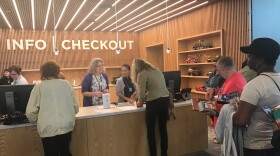Each summer morning, a large bin of bagged meals appears just inside the front door at Frankford Public Library, where kids who don’t have enough food at home can readily pick up something to eat.
In this Sussex County community, population 847, the library is filling a gap, ensuring kids who receive free or reduced-cost breakfast and lunch during the school year don’t go hungry after school lets out.
“A library is a safe and nurturing place to be,” says Rachel Wackett, the library director. “We are passionate about reading—and we also are passionate about serving people.”
Throughout the state, libraries are tailoring programs to meet the social needs of communities. The library in New Castle, where there is a large Hispanic population, is offering GED classes in Spanish. In Odessa, a hot bed of gardening, patrons can pick up seeds at Corbit-Calloway Memorial Library. In Newark, there’s bilingual story time for children in English and Chinese.
In Frankfort, where 82 percent of school-aged children are eligible for free or reduced-cost lunches, the library is partnering with Community Lutheran Church, whose members provide shelf-stable, non-perishable foods in prepackaged bags containing breakfast, lunch, a snack and a beverage.
Kids don’t have to get their parents to fill out paperwork reporting income or otherwise demonstrate a need for food. They don’t have to provide proof of age. They simply pick up meals, no questions asked.
“The library is the place you come to read, to learn, to connect with other people,” Wackett says. “It’s a safe haven.”
About 23 percent of Frankford residents are Hispanic and the library has become a resource for information about immigration. “We have Legal Aid lawyers come in to answer people’s questions and concerns,” she says.
Social workers from the state Department of Health and Social Services (DHSS) are embedded in Frankford, Dover and six other libraries, connecting patrons with health care, housing and other benefits.
In Frankford, a rural community with limited access to public transportation, having a social worker come to town greatly increases access to benefits.
“We expected there would be a lot of people who signed up for SNAP (Supplemental Nutrition Assistance Program),” Wackett says. “What surprised us is the number of older people who need help, who say ‘I’ve been sick or I’ve had a stroke and I can’t work any more.’”
For two hours each Thursday afternoon, Dorian Baker, a senior social worker at DHSS, is embedded at the library. She provides the expertise to link people with the help they need. The library provides the setting.
“It’s the place people feel comfortable,” Wackett says.
Frankford’s library was established in 1931 in a former tinsmith’s shop, with $100 in seed money from the state to buy books. Fifty years later, the First National Bank of Frankford donated its building on Main Street, where the library stands today.
It’s still the place where members can borrow a book. It’s also where people can learn to read them, through an adult literacy program. That includes a patron who had a higher purpose in learning to read, she says.
“For the very first time, she is reading from the Bible in her church. That’s extremely meaningful for her, and for us.”






